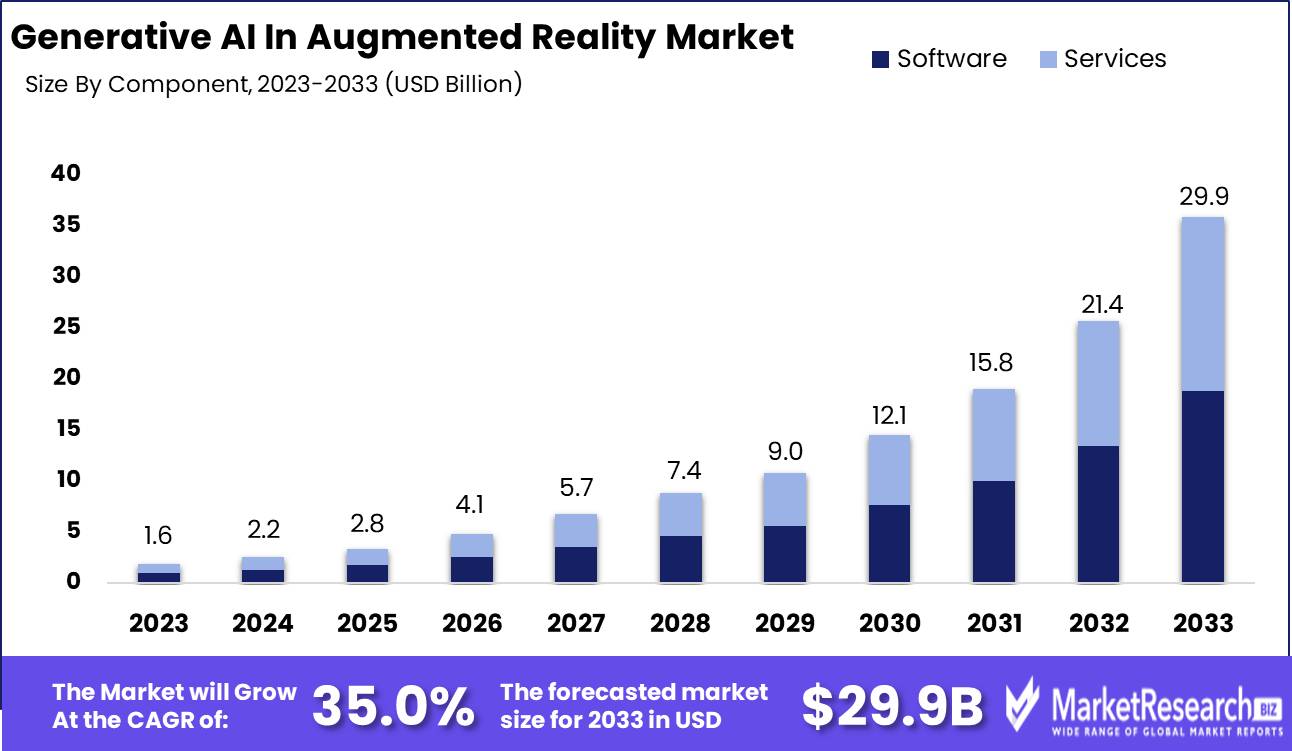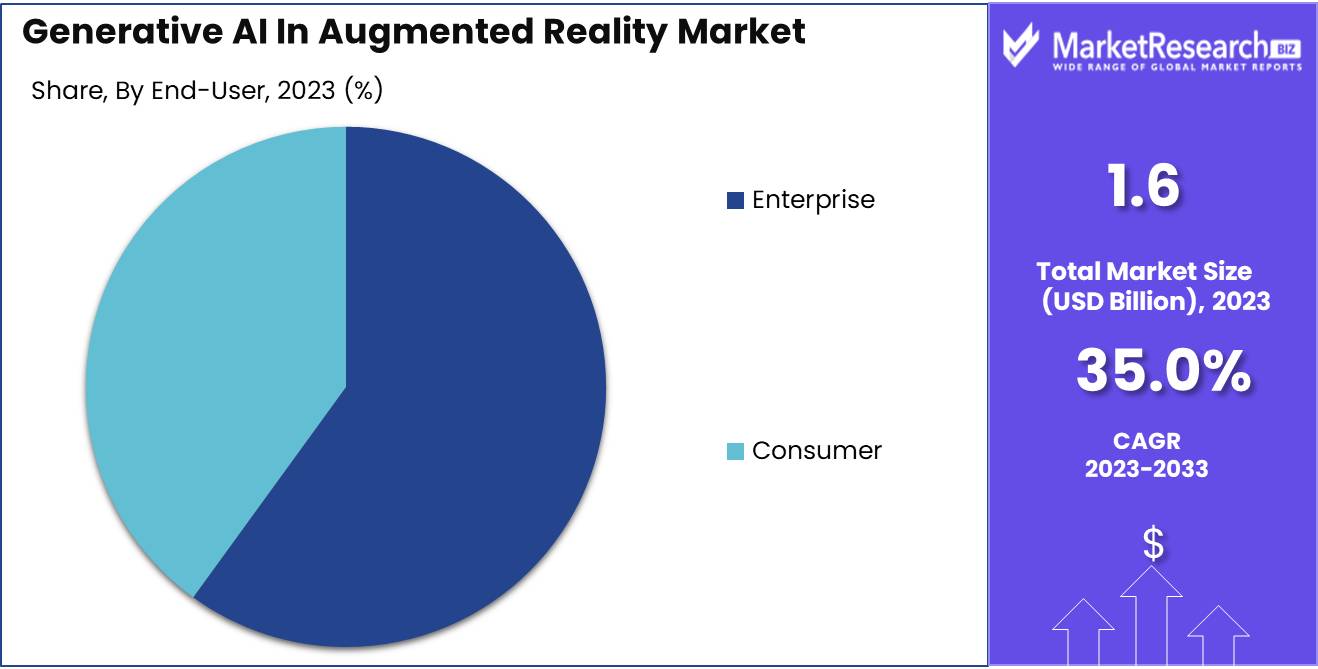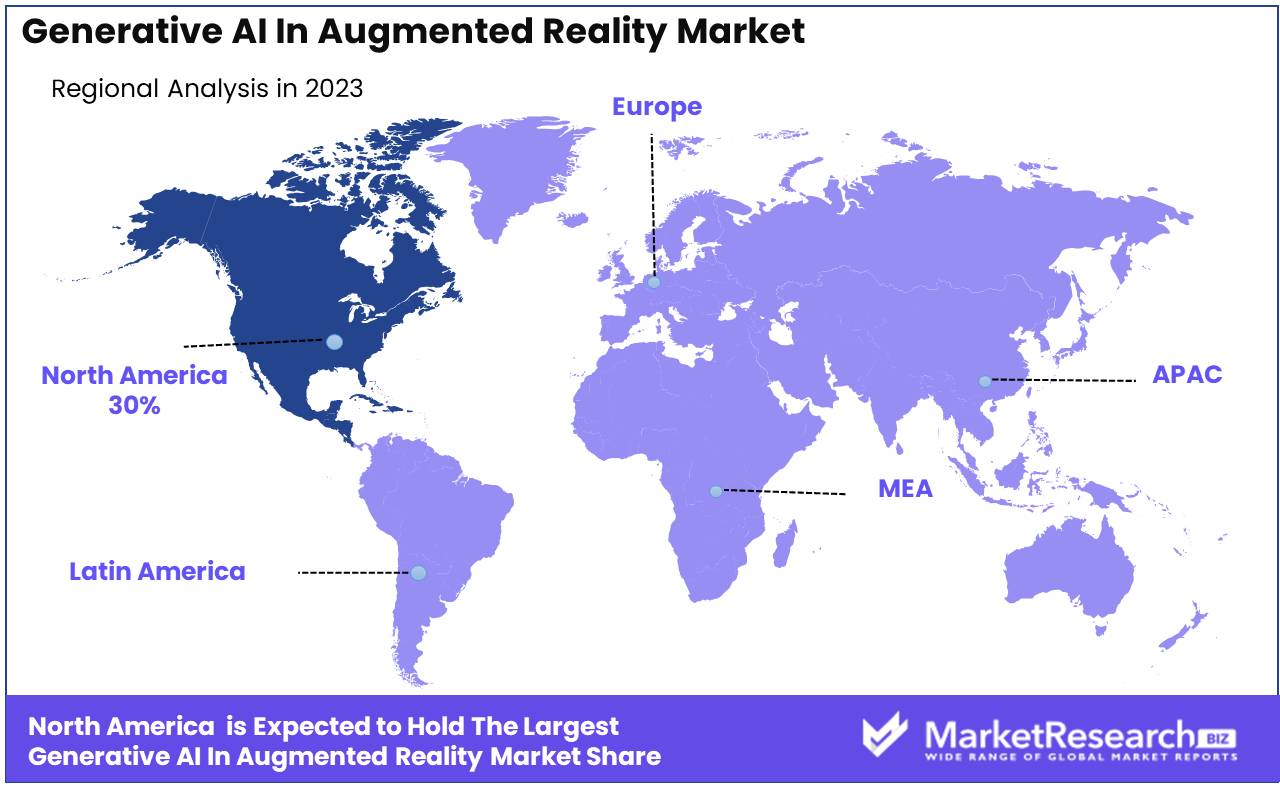
Generative AI In Augmented Reality Market By Component(Software, Services), By Application(Gaming and Entertainment, Enterprise, Education), By End-User(Enterprise, Consumer), By Region And Companies - Industry Segment Outlook, Market Assessment, Competition Scenario, Trends, And Forecast 2024-2033
-
43390
-
Feb 2024
-
179
-
-
This report was compiled by Vishwa Gaul Vishwa is an experienced market research and consulting professional with over 8 years of expertise in the ICT industry, contributing to over 700 reports across telecommunications, software, hardware, and digital solutions. Correspondence Team Lead- ICT Linkedin | Detailed Market research Methodology Our methodology involves a mix of primary research, including interviews with leading mental health experts, and secondary research from reputable medical journals and databases. View Detailed Methodology Page
-
Quick Navigation
Report Overview
The generative AI in augmented reality market was valued at USD 1.6 billion in 2023. It is expected to reach USD 29.9 billion by 2033, with a CAGR of 35.0% during the forecast period from 2024 to 2033.
The surge in demand for the gaming sector and advanced technologies are some of the main key driving factors for generative artificial intelligence in the augmented reality market. Two main technologies that can transform the way humans interact with the world around them are Gen AI and augmented reality. These technologies collaborate to generate immersive, engaging experiences that connect the virtual and real world. The emergence of Gen AI with AR is anticipated to take place in the coming future.

Gen AI models have been used in several sectors that comprise of business world, gaming, military, and law enforcement. Many developers feel that the usage of gen AI in the development of augmented reality applications will be important in the future due to its growing demand for augmented reality development equipment and the increasing range of their potentiality with time.
Augmented reality shopping has transformed the retail sector. This offers customers an interactive and engaging shopping experience that mixes the virtual and real world. Due to this, customer interaction, sales, experiences, and conversion rates have surged. Many small and medium-sized firms face substantial challenges in amending augmented reality. This is due to the highly expensive efforts needed to build 3D models for their respective products. For example, according to an article published by Artillery Intelligence in March 2023, it is anticipated that AR shopping will produce USD 254 billion in consumer spending by 2027. Due to this businesses and firms that have not yet created AR shopping tactics should have to implement it.
Moreover, as per the latest article published by Geeky Gadgets in January 2024, BMV has launched its new vehicle technology at the customer electronic show in LA and this comprises Gen AI, augmented reality (AR), and teleoperated parking, the car manufacturers has also declared the collaboration of augmented reality glasses into the driving experience. There are several benefits of using gen AI in augmented reality such as it improvises the training and education methods, accelerates the manufacturing and goods distribution channels, creates more automated and advanced, real-time feedback, and is easy to access and inclusivity. The generative AI in the augmented market trends will rise due to its demand in the gaming and other industrial sectors which will help in market expansion during the forecasted period.
Key Takeaways
- Market Growth: Generative AI In Augmented Reality Market was valued at USD 1.6 billion in 2023, It is expected to reach USD 29.9 billion by 2033, with a CAGR of 35.0% during the forecast period from 2024 to 2033.
- By Component: Software dominates the market with a commanding 64% share, reflecting its pivotal role.
- By Application: Gaming and Entertainment applications lead with a substantial 45% market share, illustrating their popularity.
- By End-User: Enterprises represent the primary end-user, commanding a significant 58% share, indicating widespread adoption.
- Regional Dominance: North America Dominates with a 30% Market Share of Generative AI In the Augmented Reality industry.
- Growth Opportunity: Customized AR shopping, powered by Generative AI, offers growth by enhancing personalization, while immersive gaming elevates market potential.
Driving factors
Increasing Demand for Immersive Experiences Drives Market Growth
The rising need for immersive experiences is an important factor in the development of the Generative AI Augmented Reality (AR) market. As consumers seek more realistic and interactive environments, AR, powered by generative AI, is becoming a key technology in meeting these expectations.
This technology's ability to create highly realistic and interactive environments is driving adoption across various sectors including gaming, retail, and events. A notable application is Nike's utilization of AR to allow customers to visualize shoes in real settings, illustrating the practical benefits and enhanced user engagement. The integration of generative AI with AR technologies is reshaping consumer interactions, making immersive experiences more accessible and versatile, thereby fueling the industry's expansion.
Enhanced Visual Content Creation Accelerates Market Expansion
Generative AI's role in enhancing visual content creation is pivotal to accelerating Generative AI in the Augmented Reality market's growth. By enabling the creation of customized, high-quality 3D image assets and environments with minimal input, generative AI significantly lowers the barriers to entry for developers and content creators.
Companies like Imersiv, which creates 3D object characters from text prompts, exemplify how these technologies can streamline content production. This efficiency not only reduces the time and resources needed for development but also opens up new possibilities for personalized and dynamic AR experiences. In the process, the market is seeing an expansion in range as well as the quality of AR applications, which is attracting more people and encouraging further investment in the field.
Faster Development of AR Apps Propels Market Dynamics
The integration of generative AI into the development process of AR applications is revolutionizing the market, significantly reducing the need for extensive 3D modeling and cutting down development time. Tools like Anthropic, which enable the generation of code for AR functions, exemplify how generative AI can streamline app creation.
This is the reason why the market is witnessing an increased quantity and types of AR applications that cater to a broader range of industries and usage cases. This rapid development cycle is crucial for keeping pace with the fast-evolving demands of consumers and maintaining the technology's relevance. The long-term implications include a more dynamic market environment, with continuous innovation and an expanded application spectrum driving sustained growth.
Restraining Factors
Limitations in Computing Power Restrains Market Growth
The limitations in computing power present in current Augmented Reality (AR) devices significantly restrict the growth of the Generative AI in the AR market. Devices like the Oculus Quest 2 encounter difficulties when tasked with running large neural networks, which are essential for powering complex generative AI models.
Consequently, this technological constraint hampers innovation, slows down the adoption rate of AR applications, and restricts the market's potential to expand. Overcoming these limitations is crucial for enabling more sophisticated and immersive AR experiences that fully leverage generative AI capabilities.
Lack of Specialized Hardware Inhibits Market Expansion
The absence of specialized hardware tailored for immersive AR experiences, coupled with the high costs associated with existing solutions, such as Microsoft HoloLens, significantly hinders the growth of Generative AI in the AR market. Dedicated hardware like 3D sensors and depth cameras, crucial for enhancing the immersiveness and functionality of AR applications, is not yet mainstream.
This scarcity of specialized hardware not only increases the cost of development and deployment for creators and businesses but also limits the accessibility of advanced AR experiences for consumers. The lack of widespread adoption of these technologies constrains the market's growth, as it prevents the full realization of generative AI's potential in creating deeply engaging and interactive AR environments.
By Component Analysis
Software Dominates With A Commanding 64% Market Share Globally.
In the Generative AI in Augmented Reality (AR) market, the software segment takes precedence, holding a significant majority of 64%. This dominance is attributed to the crucial role software plays in the development and deployment of AR applications.
Generative AI software facilitates the creation of immersive, dynamic content by enabling the generation of realistic 3D models, environments, and interactions. This capability is essential for developing AR applications that are increasingly sought after in the gaming, entertainment, retail, and educational sectors.
The software segment's growth is driven by advancements in generative AI algorithms and the increasing accessibility of development tools. These tools allow for the creation of more complex and engaging AR experiences, which in turn drives demand from both developers and end-users. The ease of integrating these software solutions with existing AR platforms further enhances their appeal, making them a key factor in the sector's expansion.
Services, as the remaining sub-segment, play a supportive role in the market's growth by offering customization, integration, and maintenance services. These services are crucial for businesses that lack in-house expertise in generative AI and AR technologies, facilitating their adoption across various industries.
By Application Analysis
Gaming And Entertainment Applications Hold A Significant 45% Share.
The Gaming and Entertainment sector emerges as the dominant application sub-segment, capturing 45% of the Generative AI in the AR market. This dominance is fuelled by the desire to experience immersive digital interactions by users. Generative AI improves the entertainment and gaming industries by creating realistic characters as well as environments and scenarios that provide users with unprecedented levels of excitement and authenticity.
This segment benefits from high consumer spending on gaming and digital entertainment, along with the rapid adoption of mobile AR games and experiences. The success of mobile AR games demonstrates the massive potential and consumer interest in augmented reality, driving significant investment and innovation in this space.
Other application segments, such as Enterprise and Education, contribute to market diversity and growth. In the enterprise sector, AR applications powered by generative AI are being used for training, simulations, and operational efficiency. Education is also seeing the adoption of AR for creating interactive machine-learning experiences, although these segments have not yet reached the adoption levels seen in gaming and entertainment.
By End-User Analysis
Enterprises Lead As The Primary End-Users With 58% Dominance.
Within the end-user segment, Enterprises account for the majority, with a 58% share of the Generative AI in the AR market. This dominance is primarily due to the wide-ranging applications of AR in various industries, including manufacturing, healthcare, retail, and education.
Enterprises are leveraging AR for training, maintenance, design, customer engagement, and marketing, among other applications. The use of generative AI in these applications allows for the creation of customized, realistic simulations and interactive experiences that can significantly enhance productivity, learning, and customer experiences.

The demand within this segment is driven by the need for innovative solutions to complex problems, where AR can offer significant advantages in terms of visualization, interaction, and engagement. Additionally, the growing emphasis on digital transformation across industries further fuels the adoption of AR technologies.
The Consumer segment, while not the dominant end-user, still plays a critical role in the market's growth. It serves as a testing ground for new applications and drives innovation through demand for gaming, entertainment, and educational content. As technology advances and becomes more accessible, the consumer segment's contribution to market expansion is expected to increase, particularly in the context of home entertainment and personal learning.
Key Market Segments
By Component
- Software
- Services
By Application
- Gaming and Entertainment
- Enterprise
- Education
By End-User
- Enterprise
- Consumer
Growth Opportunity
Customized AR Shopping Offers Growth Opportunities
Customized AR shopping, empowered by Generative AI, presents a significant growth opportunity in the market. By enabling highly personalized shopping experiences, as seen with Gap's DressBot, which allows customers to virtually try on clothing tailored to their preferences, this technology enhances customer engagement and satisfaction.
The adoption of such technologies by major retailers signals a growing trend that could redefine retail, making it more interactive, personalized, and enjoyable. This shift towards customized AR shopping experiences is expected to attract more businesses, expanding the market's scope and fostering innovation in retail technologies.
Immersive Gaming and Entertainment Enhances Market Potential
The application of Generative AI in the creation of exciting gaming experiences and immersive entertainment provides many opportunities to grow AR. AR market. Epic Games, with its AI-powered graphics, demonstrates the potential to elevate gaming and VR/AR entertainment to unprecedented levels of realism and interactivity.
This advancement not only attracts a larger audience but also sets a new standard for content quality, encouraging developers to innovate further. The trend towards more immersive experiences fuels the need to invest in AR technologies, which is expanding the potential of AR and expanding its reach. As entertainment and gaming continue to merge with advanced technologies, the sector is poised for significant growth, with generative AI acting as a key catalyst.
Latest Trends
Democratization of Development Accelerates Market Innovation
The democratization of AR development, facilitated by easy-to-use generative AI frameworks like Unity's Manticore, is a major driver of growth opportunities. By making AR development more accessible to a broader range of creators, these technologies lower barriers to entry and encourage innovation.
This accessibility has led to an increase in the range and quantity of AR applications, extending the scope of application and appeal across various industries. Faster innovation cycles, spurred by these frameworks, enable rapid response to market demands and trends, significantly enhancing the market's potential for expansion.
Multi-Sensory Experiences Drive Adoption and Market Expansion
The integration of multi-sensory experiences, combining visuals, audio, touch, and even smell, represents a substantial growth opportunity for Generative AI in AR market. Technologies like ultrasonic waves and haptics, which enable touch sensations, enhance the immersiveness of AR experiences, making them more realistic and engaging.
This multi-sensory approach not only improves user satisfaction but also broadens the applications of AR, from entertainment and gaming to education and training, where the replication of real-world experiences is valuable.
Regional Analysis
North America Dominates with a 30% Market Share
North America's commanding 30% share of the Generative AI in the Augmented Reality (AR) Market can be attributed to several key factors. The region's robust technological infrastructure, high levels of investment in AI and AR technologies, and a strong ecosystem of tech companies, including startups and tech giants, underpin this dominance.
North America, especially the United States, is home to leading AR and AI innovators like Google, Microsoft, and Apple, which drive advancements and adoption across various sectors, including gaming, retail, and education. The region's market dynamics are characterized by rapid technological adoption, significant consumer spending on technology, and supportive government policies fostering innovation.

Looking forward, North America's influence is expected to remain strong, with continued investments and innovation maintaining its leading position. The region's ongoing commitment to research and development, coupled with its capacity to integrate new technologies into the mainstream market, suggests a sustained growth trajectory and potential for further market expansion.
Europe Holds Significant Market Share
Europe stands as a significant player in the Generative AI in AR market, driven by its strong focus on innovation, robust regulatory framework, and substantial investment in technology research and development.
The region benefits from a collaborative innovation ecosystem, with numerous tech hubs and partnerships between businesses, academic institutions, and governments. This collaboration fosters advancements in AR and AI technologies, propelling market growth. Europe's emphasis on privacy and ethical standards in technology development also shapes its market dynamics, ensuring sustainable and responsible growth.
Asia-Pacific Emerges as a Fast-Growing Market
Asia-Pacific is emerging as a fast-growing market in the Generative AI in AR sector, attributed to its rapid technological adoption, booming digital economy, and substantial investments in innovation. Countries like China, South Korea, and Japan are at the forefront, driven by their strong manufacturing capabilities, government support for technology, and a large, tech-savvy consumer base. The region's dynamics are influenced by its capacity to produce and adopt new technologies at a large scale, making it a vital market for AR applications in gaming, education, and commercial sectors.
Key Regions and Countries
North America
- The US
- Canada
- Rest of North America
Europe
- Germany
- France
- The UK
- Spain
- Netherlands
- Russia
- Italy
- Rest of Europe
Asia-Pacific
- China
- Japan
- Singapore
- Thailand
- South Korea
- Vietnam
- India
- New Zealand
- Rest of Asia Pacific
Latin America
- Mexico
- Brazil
- Rest of Latin America
Middle East & Africa
- Saudi Arabia
- South Africa
- UAE
- Rest of Middle East & Africa
Key Players Analysis
In the Generative AI in Augmented Reality (AR) market, key players such as Microsoft Corporation, Google LLC, Facebook Inc. (now Meta), NVIDIA Corporation, and Samsung Electronics Co. Ltd., along with other significant entities, play pivotal roles in shaping the industry's landscape.
These companies, through their innovative efforts and strategic positioning, are instrumental in driving the adoption and development of AR technologies powered by Generative AI.
Microsoft, with its HoloLens and mixed reality solutions, and Google, through platforms like ARCore, are setting standards for immersive experiences. Facebook's rebranding to Meta signifies its deep dive into creating a more interconnected AR/VR ecosystem. NVIDIA and Qualcomm are at the forefront of providing the necessary hardware acceleration and processing capabilities essential for the complex computations required by Generative AI in AR.
Apple's continuous innovation in hardware and its ARKit for developers is crucial for creating seamless AR experiences. Magic Leap and PTC are pushing the boundaries of AR in enterprise and industrial applications, while Epic Games is revolutionizing gaming and entertainment through Unreal Engine's AR capabilities. Samsung's advanced mobile devices and AR services are making AR more accessible to consumers globally.
Market Key Players
- Microsoft Corporation
- Google LLC
- Facebook Inc. (Meta)
- NVIDIA Corporation
- Qualcomm Technologies Inc.
- Apple Inc.
- Magic Leap Inc.
- PTC Inc.
- Epic Games Inc.
- Samsung Electronics Co. Ltd.
- Other Key Players
Recent Development
- In January 2024, Walmart unveils GenAI Search for effortless shopping, leveraging AI and customer data. Shop with Friends integrates AR for social commerce, enhancing the shopping experience. InHome Replenishment anticipates needs, automating orders for pantry and fridge, redefining convenience.
- In January 2024, BCG highlights dissatisfaction with car buying, urging automotive innovation. Technologies like D2C, GenAI, and AR/VR enhance customer experience, fostering loyalty and driving sales. These advancements also cut costs and differentiate OEMs in a competitive market.
- In January 2024, BMW showcases CES 2024 innovations: immersive in-car digital experiences include gaming via BMW Operating System 9, video streaming expansion, AR glasses integration, and AI-enhanced voice assistant development with Amazon.
- In December 2023, Apple researchers unveiled groundbreaking techniques: Flash memory enables on-device AI with "LLMs in a flash," while "HUGS" revolutionizes 3D avatar generation from videos. Potential for enhanced Siri and AI integration.
Report Scope
Report Features Description Market Value (2023) USD 1.6 Billion Forecast Revenue (2033) USD 29.9 Billion CAGR (2024-2032) 35.0% Base Year for Estimation 2023 Historic Period 2016-2023 Forecast Period 2024-2033 Report Coverage Revenue Forecast, Market Dynamics, COVID-19 Impact, Competitive Landscape, Recent Developments Segments Covered By Component(Software, Services), By Application(Gaming and Entertainment, Enterprise, Education), By End-User(Enterprise, Consumer) Regional Analysis North America - The US, Canada, Rest of North America, Europe - Germany, France, The UK, Spain, Italy, Russia, Netherlands, Rest of Europe, Asia-Pacific - China, Japan, South Korea, India, New Zealand, Singapore, Thailand, Vietnam, Rest of Asia Pacific, Latin America - Brazil, Mexico, Rest of Latin America, Middle East & Africa - South Africa, Saudi Arabia, UAE, Rest of Middle East & Africa Competitive Landscape Microsoft Corporation, Google LLC, Facebook Inc. (Meta), NVIDIA Corporation, Qualcomm Technologies Inc., Apple Inc., Magic Leap Inc., PTC Inc., Epic Games Inc., Samsung Electronics Co. Ltd., Other Key Players Customization Scope Customization for segments, region/country-level will be provided. Moreover, additional customization can be done based on the requirements. Purchase Options We have three licenses to opt for Single User License, Multi-User License (Up to 5 Users), Corporate Use License (Unlimited User and Printable PDF) -
-
- Microsoft Corporation
- Google LLC
- Facebook Inc. (Meta)
- NVIDIA Corporation
- Qualcomm Technologies Inc.
- Apple Inc.
- Magic Leap Inc.
- PTC Inc.
- Epic Games Inc.
- Samsung Electronics Co. Ltd.
- Other Key Players




